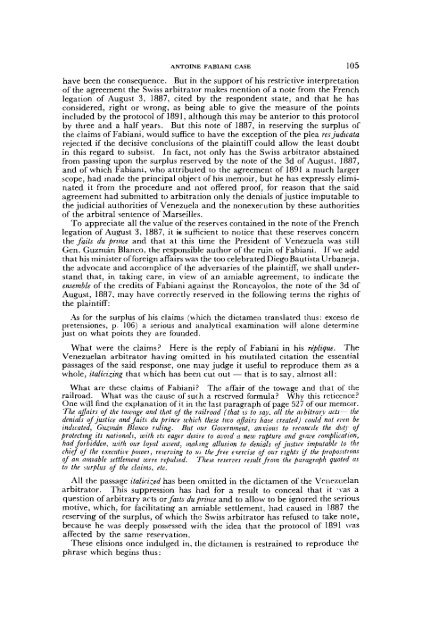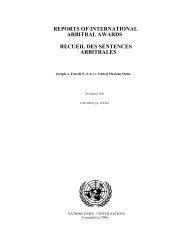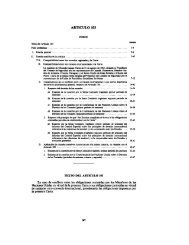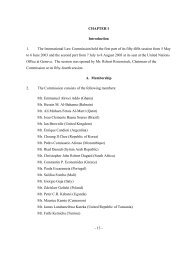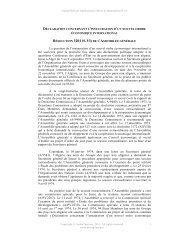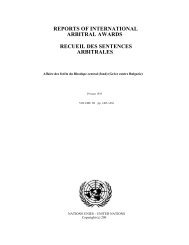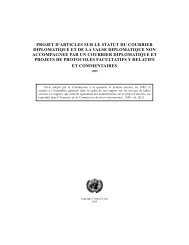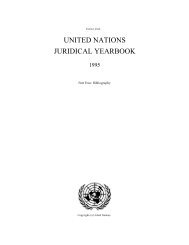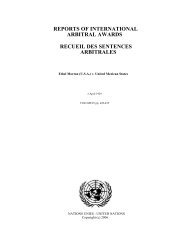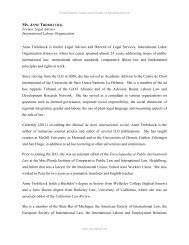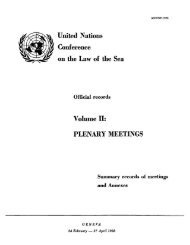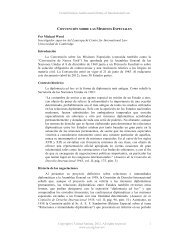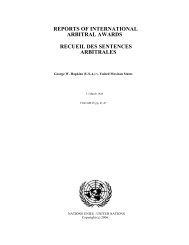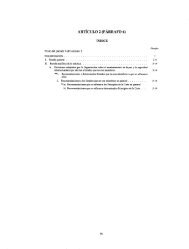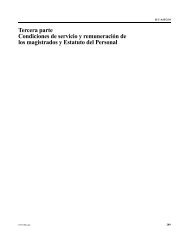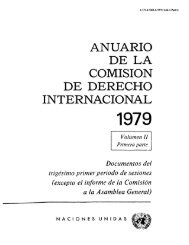Antoine Fabiani Case - United Nations Treaty Collection
Antoine Fabiani Case - United Nations Treaty Collection
Antoine Fabiani Case - United Nations Treaty Collection
Create successful ePaper yourself
Turn your PDF publications into a flip-book with our unique Google optimized e-Paper software.
ANTOINE FABIANI CASE 105<br />
have been the consequence. But in the support of his restrictive interpretation<br />
of the agreement the Swiss arbitrator makes mention of a note from the French<br />
legation of August 3, 1887, cited by the respondent state, and that he has<br />
considered, right or wrong, as being able to give the measure of the points<br />
included by the protocol of 1891, although this may be anterior to this protocol<br />
by three and a half years. But this note of 1887, in reserving the surplus of<br />
the claims of <strong>Fabiani</strong>, would suffice to have the exception of the plea res judicata<br />
rejected if the decisive conclusions of the plaintiff could allow the least doubt<br />
in this regard to subsist. In fact, not only has the Swiss arbitrator abstained<br />
from passing upon the surplus reserved by the note of the 3d of August, 1887,<br />
and of which <strong>Fabiani</strong>, who attributed to the agreement of 1891 a much larger<br />
scope, had made the principal object of his memoir, but he has expressly eliminated<br />
it from the procedure and not offered proof, for reason that the said<br />
agreement had submitted to arbitration only the denials of justice imputable to<br />
the judicial authorities of Venezuela and the nonexecution by these authorities<br />
of the arbitral sentence of Marseilles.<br />
To appreciate all the value of the reserves contained in the note of the French<br />
legation of August 3, 1887, it is sufficient to notice that these reserves concern<br />
the fails du prince and that at this time the President of Venezuela was still<br />
Gen. Guzman Blanco, the responsible author of the ruin of <strong>Fabiani</strong>. If we add<br />
that his minister of foreign affairs was the too celebrated Diego Bautista Urbaneja,<br />
the advocate and accomplice of the adversaries of the plaintiff, we shall understand<br />
that, in taking care, in view of an amiable agreement, to indicate the<br />
ensemble of the credits of <strong>Fabiani</strong> against the Roncayolos, the note of the 3d of<br />
August, 1887, may have correctly reserved in the following terms the rights of<br />
the plaintiff:<br />
As for the surplus of his claims (which the dictamen translated thus: exceso de<br />
pretensiones, p. 106) a serious and analytical examination will alone determine<br />
just on what points they are founded.<br />
What were the claims? Here is the reply of <strong>Fabiani</strong> in his réplique. The<br />
Venezuelan arbitrator having omitted in his mutilated citation the essential<br />
passages of the said response, one may judge it useful to reproduce them as a<br />
whole, italicizing that which has been cut out — that is to say, almost all:<br />
What are these claims of <strong>Fabiani</strong>? The affair of the towage and that of the<br />
railroad. What was the cause of such a reserved formula? Why this reticence?<br />
One will find the explanation of it in the last paragraph of page 527 of our memoir.<br />
The affairs of the towage and that of the railroad (that is to say. all the aibitrary acts— the<br />
denials of justice and/aits du prince which these two ajjairs have created) could not even be<br />
indicated, Guzman Blanco ruling. But our Government, anxious to reconcile the duty of<br />
protecting its national!, with its eager desiie to avoid a new rupture and gtave complication,<br />
had forbidden, with our loyal assent, making allusion to denials of justice imputable to the<br />
chief of the executive powe?, reserving to vs the free exercise of our rights if the propositions<br />
of an amiable settlement were repulsed. These reserves result from the paragraph quoted as<br />
to the surplus of the claims, etc.<br />
All the passage italicized has, been omitted in the dictamen of the Venezuelan<br />
arbitrator. This suppression has had for a result to conceal that it vas a<br />
question of arbitrary acts or faits du prince and to allow to be ignored the serious<br />
motive, which, for facilitating an amiable settlement, had caused in 1887 the<br />
reserving of the surplus, of which the Swiss arbitrator has refused to take note,<br />
because he was deeply possessed with the idea that the protocol of 1891 was<br />
affected by the same reservation.<br />
These elisions once indulged in, the dictamen is restrained to reproduce the<br />
phrase which begins thus:


